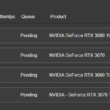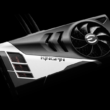Software developer Patrick Schur’s tweet carried a familiar naming scheme for AMD’s desktop offerings, mentioning the famous painter Raphael, the latest in a long series of codenames based on famous artists. The second line of his tweet, however, used the codename Phoenix in a clear reference to AMD’s upcoming Ryzen 7000 platform. The name marks a departure from AMD’s past naming conventions. Is Phoenix a reference to the Arizona state capital? Or is it the first in a series of references to mythological creatures? What motivated AMD to move away from famous artist names?
Regardless, the CPUID revealed in the post, A70F00, lends further evidence that the Phoenix chip is a mobile one, as does the fact that the fact, revealed in the tweet, that the chip will use the FP8 socket, a follow-up to the the current FP6 socket and the FP7 socket, currently expected to be used only on the Ryzen 6000 series.
Adding to the excitement is the reasonable speculation about the upcoming chips. With the expected move to the 5nm process, it’s been speculated that more cores will be available on these chips; some believe the Phoenix APUs could feature up to 12 cores. Moreover, many insiders and experts have anticipated an upgrade to PCI Express 5.0, providing a twofold increase in transfers per second compared to PCIe 4.0. However, initial chips might limit how many lanes can be used. Thus far, it’s expected that the chip will continue using the Navi iGPU.
Of course, it will likely be some time before any Ryzen 7000 chips are available, as we’re still awaiting the release of the Ryzen 6000 series some time in 2021 or, perhaps, even 2022. While the Ryzen 6000 series shows tremendous promise, with support for both DDR5 and PCIe 4.0, these recent leaks show that AMD is plowing forward in terms of innovation and shows no signs of slowing down. When AMD initially launched the Zen platform, reviewers and experts stated their belief that these microarchitectures showed tremendous potential for future upgrades, potentially leaving Intel scrambling to keep up. As the Ryzen 6000 and Ryzen 7000 roadmaps and rumors show, it’s clear that AMD has a winning solution on its hands.
nerdspeak.net is supported by its audience. When you purchase through links on our site, we may earn an affiliate commission.









